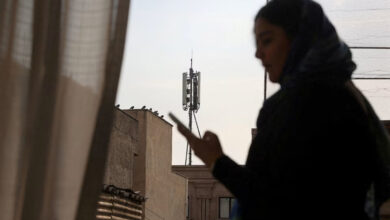Lebanese censors on Saturday reversed their decision to ban “On the Importance of Being an Arab,” a monodrama by Egyptian theater director Ahmed al-Attar, from showing at the Monnot Theater in Beirut.
“On the Importance of Being an Arab” was scheduled to show last weekend, when Attar suddenly received a request from Lebanese censors asking him to modify some acts in the show.
Bewildered by such a request in what is known to be one of the most liberal of Arab cities, Attar refused.
“Art is that mixture of words, movements, lights, costumes and even one’s whispers on stage,” he told Egypt Independent. “One cannot take away one aspect [of a work of art], and deem it ‘unacceptable’ in isolation from the rest of the work…This doesn’t lead to art.”
Every element of a piece should be evaluated in relation to the whole, he added.
What the censors deemed unacceptable, according to the Lebanese daily Al-Akhbar, was a scene in which Attar criticizes key figures of the Mubarak regime.
Parts of the monologue said, “I’ll hit him with a shoe,” referring to former Information Minister Anas al-Fiqqi, Osama Saraya, the former chief editor of state-run newspaper Al-Ahram, and former Prime Minister Atef Ebeid.
The censors’ decision to ban the show was severely criticized in Lebanese media, pressuring them to postpone the show until next month rather than canceling it.
In a statement sent by the censors to Al-Akhbar, they tried to clear their position.
“There has been a misunderstanding between the artist, the administration of Monnot [theater] and the Lebanese Censorship Authority," the statement read.
Attar told Egypt Independent that he doesn’t have a reasonable explanation for the censors’ decisions on his show.
“The show doesn't deal with any Lebanese issues. But the result is that it will be delayed for a month or two because of rescheduling issues, resulting from delaying the censor’s approval.”
“On the Importance of Being an Arab” survived the Egyptian Board of Censors for two years. It was first shown in July 2010, and was based on recorded phone calls between Attar and his friends, family and ex-wife. The play reflects on ongoing events and criticizes political and social conditions. Attar has been recording these phone conversations since the 1980s.
On stage, Attar reenacts his conversations and emotions, taking the audience back to specific events. In every performance he chooses different conversations pertinent to ongoing events.
In the latest version of the show, “The Revolution Tapes,” Attar performs his phone calls from 2 February to 11 February 2011, with the same concrete room and phone handset as a backdrop.
“The former regime paid little attention to theater,” Attar told Egypt Independent. “It believed that 1,000 people watching a critical show wouldn't change anything in reality. The revolution proved that it does.”



